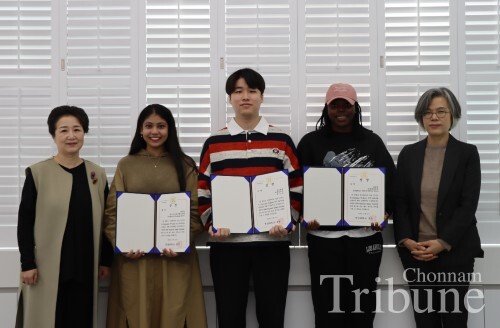
The Chonnam Tribune held the 2022 English Essay Contest on Oct. 8 to celebrate the 70th anniversary of Chonnam National University (CNU) and the Tribune’s 54th anniversary. Since 1988, this annual competition has aimed at improving the English writing proficiency of Korean and international undergraduate and graduate students who are studying at universities located in Gwangju Metropolitan City and Jeollanam-do Province.
44 international and Korean students participated in this year’s event. An essay topic was announced on the Tribune website at 2 p.m. on Oct. 8. The topic was as follows: Universities in South Korea are facing an existential crisis as the enrollment rate falls due to the decline of the school-age population. This situation has become inevitable even for flagship national universities in non-metropolitan areas. Experts have noted that the current university crisis will lead to a regional extinction and emerge as a national crisis. What do you think are effective measures to overcome the crisis of Korean universities? Use specific reasons and examples to explain your opinion. The applicants completed their essay within four hours and submitted it by email no later than 6 p.m. that day.
Four students from CNU won top prizes at the competition. On Nov. 11, Dean of Student Affairs Nam Ho-jung (Professor, Dept. of Design) gave awards to the contest winners at the awards ceremony. The winners were as follows.
Grand Prize: Jasmine Gnanam John (Ph. D. Student, Interdisciplinary Program of Global Diaspora Studies, Graduate School, CNU)
Gold Prize: Eom Hyo-jung (Master’s Student, School of Dentistry, CNU)
Silver Prize: Hong Seung-hyun (Senior, Dept. of Biotechnology and Bioengineering, CNU)
Bronze Prize: Oluwatuyi Toyin Bukola Kezia (Master’s Student, Dept. of Agricultural Economics, Graduate School, CNU)
Judges’ Review
By Ahn Yoo-young, Ph.D., Lecturer, Language Education Center
Kim Jeong-a, Ph.D., Lecturer, Language Education Center
We two reviewers would like to express our gratitude for letting us have the opportunity to read seventeen candidate essays before anyone else. For this year’s contest, the competitors were required to provide “effective measures to overcome the existential crisis of Korean universities as the new student enrollment rate falls in Korea.” For the writers, this topic appeared more challenging than any previous topic such as “Effective online learning strategies in the era of COVID” in 2020 and “Green wash” in 2021 since it is related to the drastic decrease in the birth rate in “Korea”, which might have been affected by social and financial issues complicatedly weaved in the community. For this reason, it was impressive to observe not only Korean but also international students arguing how to resolve the problems in “Korea” so that Korean universities continue to take part in education for the future of “Korea”. From this observation, we realized, regardless of nationality, young students of the MZ generation strive to understand the society they currently belong to and the issues it faces. We highly appreciate the participants’ interest in the problems, their hard work and efforts to research the topic, collect information, organize ideas, and provide detailed solutions to yield outstanding essays.
However, there were some significant issues that drew the reviewers’ attention. Unlike the primary aspects that the selected essays represented, other essays tended to provide too much background information before their thesis. Often it resulted in being too analytic without bringing the writers’ argument, which should be discussing “measures” to manage the crisis, and taking up too much space at the beginning. Relevant mistakes included having limited space to elaborate their reasoning with relevant examples in the main paragraphs. In addition, multiple essays lacked objective evidence, assuming readers’ agreement with the writer’s perspective. It is the mistake that novice writers could easily make. Thus, we suggest reflecting on what a writer’s stance and use of examples should be in argumentative writing.
Last but not least, we cannot emphasize the importance of sentence-level issues enough. Although both judges tried to focus on ideas, not on language mistakes, some of them were too important to move on from. Often those are the mistakes that could be addressed by the writers themselves. Another aspect that writers should be wary of was mistakes related to translating Korean sentences into English. It is important to note that such attempts to find an equivalent for every word, deserve another round of revision.
We would like to finish our review by encouraging students to participate in next year’s English essay contest - it is a great opportunity to practice your analytical and critical thinking on issues that we face altogether, as well as your English writing skills.

